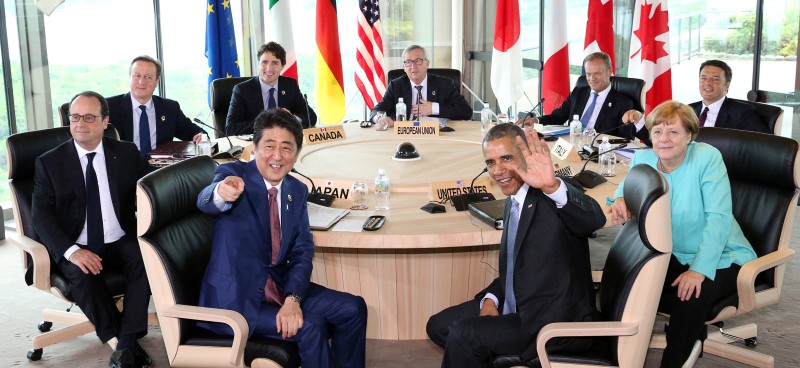G7 and ECB Meetings, Russia Default, Nike Earnings – What’s Moving Markets
2022.06.27 13:15

By Peter Nurse
Investing.com — The G7 continues its three-day meeting with Russia very much on the agenda, as Moscow defaults on its foreign-currency sovereign debt for the first time in over a century. Wall Street heads for a positive start to the week, ahead of the latest results from Nike. ECB starts a forum with news about its anti-fragmentation tool awaited, while crude prices edged lower ahead of OPEC news. Here’s what you need to know in financial markets on Monday, June 27.
1. G7 to try and curb Russia’s revenue
The leaders of the Group of Seven advanced economies will continue their three-day summit Monday, with Russia’s invasion of Ukraine and the state of the global economy the main topics in discussion.
The major democracies will discuss further sanctions on Moscow as Russia stepped up its missile barrage on Kyiv, Ukraine’s capital, a move which U.S. President Joe Biden condemned as “barbarism.”
The group is expected to announce a ban on imports of Russian gold on Tuesday, as well as further tackle rising energy prices, potentially with a price cap on Russian crude and oil products exports.
The prospect of reviving the Iran nuclear talks is also likely to be touched upon, as the reintroduction of Iranian oil into the global market could help ease the current supply tightness. However, these talks have been stuck for a number of months now and the Iranian leaders are sure to drive a hard bargain, given the difficult situation the Western leaders find themselves in.
2. Russia defaults for first time in over a century
Russia has defaulted on its foreign-currency sovereign debt for the first time since 1918, and the Bolshevik era, following the expiry of a key deadline on Sunday.
Moscow was due to make payments of $100 million in interest on two bonds, one denominated in U.S. dollars and another in euros on May 27. The payments had a grace period of 30 days, which has now expired.
Russia has repeatedly said it has the money to make the payments and thus there are no grounds for a default, but Western sanctions put in place in the wake of the invasion of Ukraine mean it is unable to send money to the bondholders.
It’s debatable how much impact this will have in the near term, given Russia cannot borrow internationally at the moment and still has buyers for its oil and gas, primarily China and India, but it’s likely to raise its borrowing costs in future.
3. Stocks set to open higher; Nike results due
U.S. stock markets are set to open moderately Monday, continuing the rebound seen at the end of last week as investors try to assess whether the market has found a bottom or whether this bounce will be short-lived.
By 05:45 AM ET (0945 GMT), Dow Jones futures were up 115 points, or 0.4%, while S&P 500 futures were up 0.5%, and Nasdaq 100 futures were up 0.7%.
The three cash indices posted last week their first positive week since May, with the blue-chip Dow Jones Industrial Average gaining 5.4%, the broad-based S&P 500 6.5%, and the Nasdaq Composite climbing 7.5%.
That said, the month of June ends later this week and fears of recession as central banks aggressively tackle rampant inflation with sharp interest rate hikes mean this will be one of the worst first halves for stocks in decades.
Nike (NYSE:NKE) offers up its fourth quarter results after the close Monday, and this comes just a few days after the athletic footwear manufacturer announced plans to make a full exit from Russia.
In terms of data, May durable goods growth is expected to slow, while May pending home sales should show how much rising mortgage rates are hitting the housing sector.
4. ECB starts forum; Anti-fragmentation tool eyed
The European Central Bank starts a three-day forum Monday in Portugal, just a few days after its policymakers made clear that it would be raising interest rates next month, joining the stampede to tighten monetary policy in the wake of historic highs in inflation.
This resulted in a jump in Italian bond yields, which prompted the ECB to further announce that it was devising a planned anti-fragmentation tool, news of which will be eagerly awaited by investors.
The main event will be Wednesday’s panel discussion, including President Christine Lagarde, Federal Reserve Chair Jerome Powell, and Bank of England Governor Andrew Bailey, for insights on how the central bank heads view the trade-off between curbing inflation while still trying to ensure a soft-landing for the global economy.
The ECB announced Monday it is changing the publication time of its monetary policy decisions and the timing of the subsequent press conferences as of July. The rate announcement will now arrive at 2:15 PM Frankfurt time (instead of 1:45 PM) and the conference at 2:45 PM (instead of 2:30 PM).
5. Oil set for weekly fall; OPEC+ to stick to output plan
Crude oil prices edged lower Monday, continuing the previous week’s weakness which saw the global benchmark Brent contract falling more than 7% over concerns over the macro outlook.
Traders will be keeping a close eye on the ongoing G7 meeting (see above), given the potential for further moves against Russia’s energy exports as well as the potential restart of Iranian nuclear talks.
The Organization of Petroleum Exporting Countries and allies also meet this week to discuss the group’s production levels. The cartel, known as OPEC+, is widely expected to stick to its plan on Thursday to boost output by 648,000 barrels a day in July and by the same amount in August.
By 5:45 AM ET, U.S. crude futures were down 0.3% at $107.28 a barrel, while Brent crude was down 0.2% at $108.91 a barrel.








